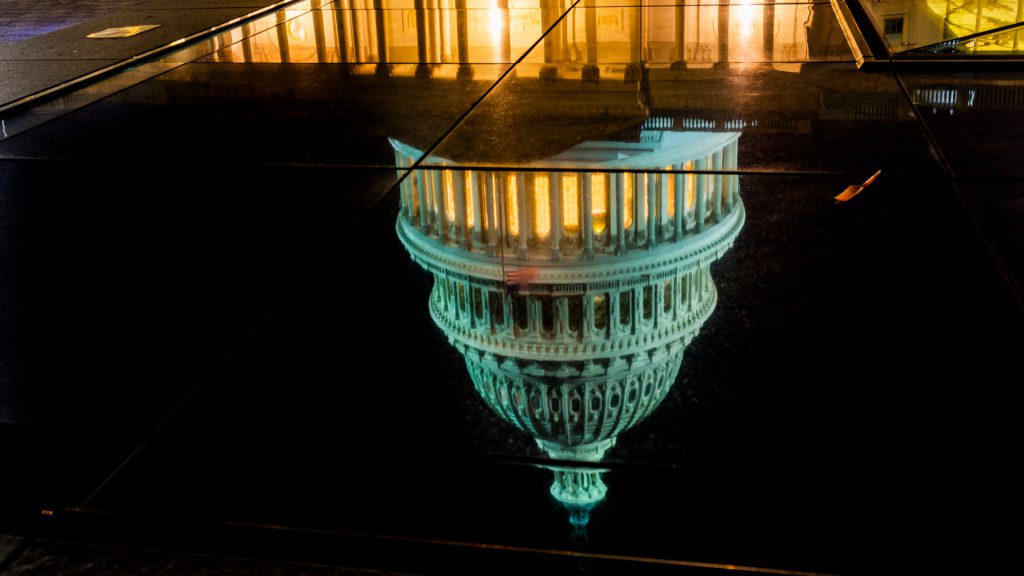
Published January 7, 2021
The scene that unfolded at the U.S. Capitol yesterday—an insurrection in all of its ugliness, all of its violence, and all of its kaleidoscopic horror—is the responsibility of Donald Trump. But it doesn’t stop there.
It is also the responsibility of countless of his aides and supporters, those in right-wing media and Trump’s evangelical backers, “intellectuals” and pseudo-historians, Republicans in Congress and outside it, all of those who have stood with Trump at every moment in his corrupt and corrupting presidency. It is the responsibility of Trump allies who attacked those who warned that Trump was malicious and malignant; who said that he was an institutional arsonist who would do grave damage to the nation; who warned about his race-baiting, his constant provocations, the psychic delight he took in dividing Americans and stoking grievances; and who raised concerns because Trump’s sociopathic tendencies might lead him, and those who followed him, to very dark places.
President Trump is the architect of this insurrection, but so are his acolytes.
Donald Trump has been deformed and deranged for much of his life. It has been the pattern of his life to lie and to cheat, to intimidate and hurt others, to act without conscience, to show no remorse, and to make everything about himself. None of this was a secret when he ran for president, and certainly none of it was a secret once he became president. His viciousness, volatility, and nihilism were on display almost from the moment he took office. As president, he has acted just as one would have expected. He has never deviated from who he is.
But Trump couldn’t have done this by himself. He needed others in his party to defend him and support him, to make excuses for him and to go silent at key moral moments. He needed others to attack his critics, advance his conspiracy theories, and pretend that his lawlessness and impeachable crimes were perfectly fine. He needed evangelical leaders and social conservatives to insist that he was the right man to advance their agenda, that he was the “fighter” they’d never had but were happy to welcome to their side. He needed people who pretended that his only problem was was his poor “manners”—his “occasional crude language and intemperate tweets,” in the words of the right-wing radio host Dennis Prager. He needed a base that justified its cultlike allegiance to him by insisting that he was just the “disrupter” America needed, that a little chaos would be good for us, and that Trump was the only man who had the guts to take on the “establishment” and “drain the swamp.” He needed men and women who said he was simply giving powerful voice to their understandable concerns.
Trump needed Republican leaders and aides who looked the other way, who employed blinding double standards, who trashed Trump to journalists off the record but praised him on the record. He needed a vice president who extolled his “broad-shouldered leadership.” He needed people who’d convinced themselves that they would use him to serve their ends when in fact he used them to serve his ends. He needed people who said that those who spoke the truth about Trump were “haters” who suffered from “Trump derangement syndrome” and “obsessed” too much about him. Trump needed supporters who said his critics should focus not on him—he was, at worst, a “symptom” of the problem—but on the media, or the Democrats, or critical race theory, or someone else, or anything else.
Trump needed people around the nation to pretend that he was not who he so unmistakably was. He needed senators like Ted Cruz, Josh Hawley, John Kennedy, Lindsey Graham, and many of their colleagues; Republican representatives like Louie Gohmert, Jim Jordan, Matt Gaetz, Mo Brooks, and scores more; and countless others who thought they could ride the back of the tiger but who have now ended up mauled.
Elected Republicans decided to make a deal with the devil. Part of the bargain—the part they liked—was access to power and influence, this tax cut and that appointment, their silent belief that Trump would further their career ambitions. But the other part of the bargain—the part they aren’t so eager to admit to now—is what we saw yesterday, as the Capitol was engulfed in mob violence. But this, or something like this, is where the Trump presidency was always going to end. Donald Trump promised as much. And worse may yet come. The president appears to be spiraling downward, psychologically and emotionally. This is a very dangerous time for America.
We will now hear a conga line of Republicans and people on the right—the very ones who in one way or another empowered this malicious president—condemn Trump, less than two weeks before he leaves office. They will act shocked—shocked!—that Trump incited the mob and then condoned what it did. Some of them will act as if no one could have seen this coming; others will tell us it was inevitable, even as they didn’t lift a finger to stop it. They will reach for words to express their horror, their sadness, their moral outrage.
“This is what you’ve gotten, guys,” Senator Mitt Romney of Utah said to his colleagues who were promoting the president’s conspiracy theories in Congress as the siege unfolded. “This is what the president has caused today, this insurrection,” he said later.
But here’s the thing. Mitt Romney stood almost alone among elected Republicans during the Trump presidency. He was viewed as a pariah, a troublemaker, a traitor, a RINO (“Republican in Name Only”). So were a few others who don’t serve in Congress but who have been part of the Republican Party for their entire adult lives, and who could not stay silent as Donald Trump took a blowtorch to our country and its ideals.
That so many Republicans are now speaking up—1,448 days into the Trump presidency and in the immediate aftermath of an insurrection effort staged by a pro-Trump mob—is better than nothing. The trauma of this moment may even catalyze for some Republicans a searching reexamination of what went wrong and a desire for reconciliation. Let’s hope so.
But reconciliation can’t happen without truth, and the truth is that the blame for the American carnage we saw unfold in Washington, D.C., on January 6, 2021, can be laid at the feet of the president and his many Republican enablers. Those with integrity will admit, first to themselves and then to the wider world, their complicity in the deceitful and disgraceful presidency of Donald Trump. It is the only decent thing to do, and we’ve gone far too long with an absence of decency.
Peter Wehner is a contributing writer at The Atlantic and a senior fellow at the Ethics and Public Policy Center. He writes widely on political, cultural, religious, and national-security issues, and he is the author of The Death of Politics: How to Heal Our Frayed Republic After Trump.








